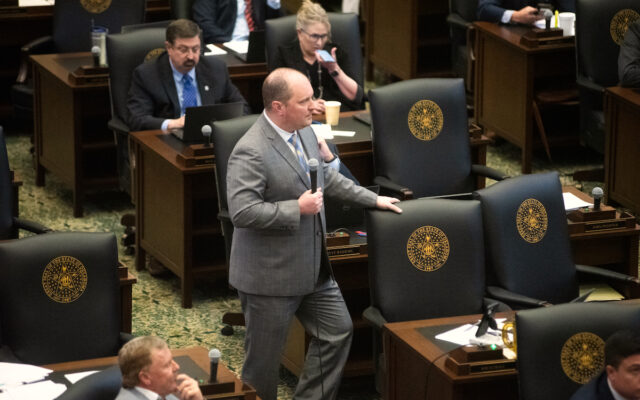

As the Catholic Archdiocese of Oklahoma City and Diocese of Tulsa consider revisions to their application for a state-authorized charter school, a bill prohibiting the denial of state funding or services based solely on religious affiliation has passed the Legislature and is awaiting Gov. Kevin Stitt’s signature.
If Stitt signs it, SB 404 would change state statute so that “it shall be deemed a substantial burden to exclude any person or entity from participation in or receipt of governmental funds, benefits, programs, or exemptions based solely on the religious character or affiliation of the person or entity.”
The measure passed the House 64-27 on Monday, with seven Republicans joining 20 Democrats in opposition. Democrats argued the bill will allow state-funded religion.
The bill’s lead author, Sen. Julie Daniels (R-Bartlesville), said she is confident the governor will sign the bill into law.
“I’m very gratified that we got it passed,” Daniels said. “I am absolutely confident that the governor will sign it.”
Both Daniels and the bill’s House author, Majority Floor Leader Jon Echols (R-OKC), cited recent Supreme Court cases involving state funds going to religious schools for why the bill was needed.
“In recent years, there were three Supreme Court cases quite close together that all dealt with establishment of religion issues,” Daniels said. “And just incidentally, they were all involving schools — religious schools being denied certain benefits that were being offered to other schools. And basically, we updated [state statute] to say, ‘You can’t deny a benefit largely on the basis of the character of the person or the institution being religious.'”
Daniels said that the Catholic Diocese originally brought the idea for the bill to her.
Brett Farley, executive director of the Catholic Conference of Oklahoma, celebrated the bill’s passage on Tuesday.
“Obviously, we’re very happy that it passed,” Farley said. “This is a bill that was inspired by Oklahoma faith leaders and the Catholic Conference to further implement protection for religious organizations.”
Echols echoed a similar sentiment as he presented and defended the bill on the House floor.
“If I were if I were to replace the word religion (in the bill) with gender, or sex or race, this wouldn’t even be controversial,” Echols said.
The bill’s passage comes as the Catholic church is currently revising an application to the Statewide Virtual Charter School Board for a Catholic virtual charter school. Board members rejected the original application amid uncertainty about its legality and questions about its administrative setup.
Farley said SB 404 had been in the works long before the application, but he said the bill could clear up some constitutional questions of the legality of a religious charter school in Oklahoma.
“This was a bill that was that was in the works and planned on long before any question related to a Catholic charter school was even on the radar,” Farley said. “So any insinuation that the two things are connected is completely false. This bill was drafted long before [Attorney General Gentner] Drummond’s opinion came out.”
Seven Republicans oppose bill
Though none of them debated against it Monday, seven Republicans voted with Democrats against the bill:
- Rep. Ty Burns (R-Pawnee)
- Rep. Ronny Johns (R-Ada)
- Rep. Cynthia Roe (R-Lindsay)
- Rep. Danny Sterling (R-Tecumseh)
- Rep. John Talley (R-Stillwater)
- Rep. Mark Vancuren (R-Owasso)
- Rep. Josh West (R-Grove)
During debate, Democrats pointed to Article 2, Section 5 of the Oklahoma Constitution, which prohibits public money from going to religious institutions, as reason to vote against the bill.
“Please uphold the oath of office that you took and the state Constitution and send a clear message that you support the will of people by voting no on this ridiculous bill,” said Rep. Mickey Dollens (D-OKC).
Daniels and Farley both said recent Supreme Court cases had rendered that section of the Constitution unenforceable.
Other Democrats argued that if religious programs or schools receive state money because of the bill, then they should be subject to the same laws and regulations as other recipients of state money, such as public schools.
Echols said he would be in favor of attaching strings to public funding that goes to religious institutions, and he also pointed out that while his bill prohibits discrimination based solely on religion, it does not prohibit denying state funds for other reasons.
“I’m not saying, ‘With money doesn’t come strings,'” Echols said. “With money, should come strings.”
Private Catholic school settles federal claims
In other news regarding Catholic schools in Oklahoma, federal prosecutors announced earlier this week that Good Shepherd Catholic School in Oklahoma City has agreed to pay $354,000 to settle claims “stemming from allegations that GSCS submitted false claims to TRICARE for services provided to students with autism.”
“The United States alleges that from May 13, 2013, to December 20, 2016, GSCS knowingly submitted false or fraudulent claims to TRICARE for providing ABA services to TRICARE beneficiaries,” according to a press release from the office of U.S. Attorney Robert Troester. “The claims were allegedly false or fraudulent because the ABA services were provided in a group setting and not on a one-on-one basis as required. To resolve the claims, GSCS agreed to pay $354,000 to the United States.”
The release said that GSCS — located on the Mercy Hospital campus on North Meridian Avenue in OKC — did not admit liability and the government did not make any concessions about the legitimacy of the claims owing to the settlement.
(Correction: This article was updated at 1:27 p.m. on Tuesday, May 2 to correct references to the Catholic Church, Catholic Conference and Oklahoma Faith Leaders.)




















